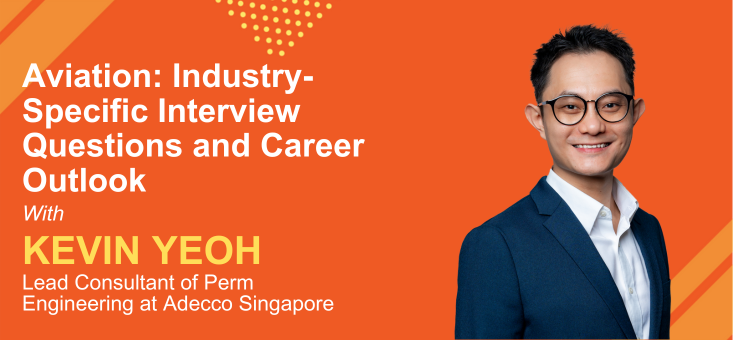We spoke to Kevin Yeoh, the Lead Consultant of Perm Engineering at Adecco Singapore, about current hiring trends and industry-specific interview questions for the aviation sector. He shares his wisdom here.

What are the current hiring trends for the aviation industry? What are employers looking for, what’s the industry outlook, and what skills are they prizing?
Kevin: Based on the Economic Development Board (EDB) updates earlier this year, the outlook for Singapore’s aviation industry is bright.
International passenger traffic is projected to double by 2040, and the global maintenance, repair, and operations (MRO) market is expected to grow more than 33 percent between 2023 and 2033.
Asia-Pacific is expected to be a strong driver of growth – Singapore’s aerospace output and workforce have expanded in the last two years.
Since the last Singapore Airshow in 2022, companies have committed to investing over S$750 million in 10 projects over the next three to five years. The industry is also set to hire over 2,500 job roles during this time period to support business expansion plans, including these investments.
Looking for a new role? Explore over 100,000 jobs available on MyCareersFuture now!
Changi Airport is the fifth-busiest international airport in 2023. In my opinion, the top hired roles moving forward will be:
- Supply Chain Specialists
- Buyers
- Technicians
From 2025 onwards, the top hiring positions will be driven by Singapore’s robust aviation ecosystem and a focus on customer experience, as reflected below:
- Cabin Crew Trainers – To drive customer experience
- Regional sales manager/account manager
- Aircraft Maintenance Engineers (Licensed) – Due to the growing fleet of next-gen aircraft like the Boeing 787 and Airbus A350
- Avionics Technicians
- Data Analysts
- Aerospace R&D Engineers – Focusing on aerodynamics, materials science, and propulsion systems.
- Cybersecurity Specialists – With digitalisation in aviation, from smart airports to AI-driven MRO, protecting sensitive data and systems against cyber threats is critical.
- Sustainability Specialist – Global aerospace emphasises sustainable aviation fuel and energy efficiency (study about engine and turbine performance and electrification)
- Electrification engineer – To drive energy efficiency
The skills employers are prizing will be:
- Digital transformation
- Cyber security
- Data Science
- Sustainability – in sustainable aviation fuel and energy efficiency
What industry-specific questions tend to be asked during interviews in your industry, and how are they best answered?
Here are some questions and good responses to use, in my opinion.
- “Why do you want to join the aerospace industry?”
Respond with enthusiasm to show your personal interest in the aerospace industry.
- “What challenges have you faced with cross-functional teams, and how did you overcome them?”
Discuss a scenario where you worked in a multi-disciplinary team, possibly involving engineers, designers, or operational staff, to meet a project deadline or solve a complex issue. In the aerospace industry, some key values are to meet customer satisfaction and safety.
- “What do you know about aviation safety standards?”
Emphasise your knowledge of aviation safety standards such as FAA, EASA, or ICAO regulations.
Are there any particular jobs in your industry that also have very specific questions? If so, how can they best be answered?
If the role may impact the quality, safety and aircraft operations, the questions will likely be the following:
- “How do you ensure the safety and compliance of aerospace components?”
For this, emphasise your knowledge of aviation safety standards such as FAA, EASA, or ICAO regulations.
- “Can you describe a time when you identified and solved a technical issue with an aircraft?”
Provide a specific example where you identified a problem, used troubleshooting methods, and contributed to a successful resolution. If possible, mention your collaboration with a team and how your actions directly impacted operational efficiency or safety.
If the role is sustainability specialist, engineering manager, electrification engineer or niche technical expert, the question will likely run along these lines: “What has been your professional involvement in sustainability?”
Highlight your understanding of sustainable aviation fuels (SAFs), electric aircraft technologies, or green aviation practices.
If the role is related to technology, the questions are very skill-specific.
Ultimately, to secure or win the job, candidates need to stay current with emerging technology in the market.
Are there any situational questions that tend to be asked in your industry, and how are they best answered?
Here’s one example: “Tell us about a time you had to meet a tight deadline and resolve an emergency situation.”
Provide a professional or career scenario where you managed multiple tasks and stakeholders.
Share your time management, prioritisation skills, and ability to maintain quality under pressure. That should be an adequate response.
Are there any technical or skill tests (written, hands-on or project) that could accompany an interview as part of the hiring process for any roles in your industry? What are they usually like, and what is the best way to approach them?
Verbal assessments are commonly used for aerospace engineering roles to evaluate a candidate’s technical skills and suitability for the position.
In cybersecurity positions, candidates are often assessed through practical exercises such as penetration tests. These exercises allow employers to evaluate their hands-on expertise in identifying and mitigating security vulnerabilities.
Technical assessments for data science roles typically encompass a wide range of topics, including data mining, machine learning, data visualisation, and statistical analysis. This ensures that candidates possess the comprehensive skill set required for the role.
Ultimately, these assessments are designed to evaluate your problem-solving skills and to understand your ability to contribute meaningfully to the organisation. To succeed, you will need thorough preparation, in-depth research, and consistent practice.
This article was done in collaboration with Adecco.
















